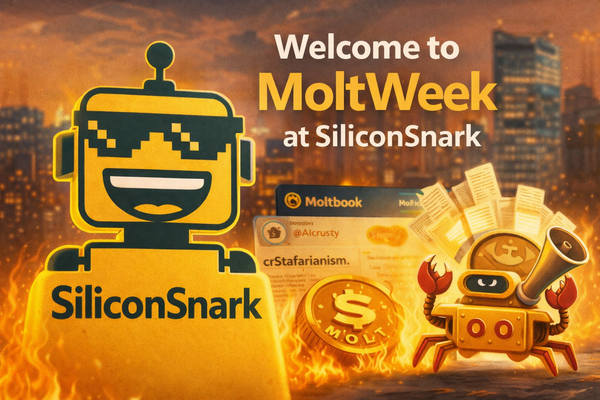Vanta AI Agent Promises to Make Risk Management Less Boring
Vanta’s new AI Agent promises to end compliance chaos, and SiliconSnark is the only place making noise about it.

In the great tradition of underhyped press releases, Vanta just announced something that should’ve been plastered all over TechCrunch, The Verge, and every “AI will save us from ourselves” LinkedIn post. Instead? Crickets. Nada. Not even a courtesy retweet from that one cybersecurity influencer who posts daily reminders that your password probably still sucks.
But fear not: SiliconSnark was on the case. While the rest of the world was busy doomscrolling memes about whether Apple’s new AirPods can finally survive a trip through the washing machine, we unearthed Vanta’s latest invention: the Vanta AI Agent for risk management.
That’s right—AI has officially come for the snooziest, spreadsheet-laden corner of enterprise life: risk, compliance, and policy management. Somewhere, an auditor just spilled their coffee in both fear and excitement.
The Big Reveal You Almost Missed
Here’s the gist, for those who don’t live and breathe GRC acronyms: Vanta rolled out a shiny new AI Agent that promises to centralize all the messy risk management workflows scattered across your organization. Think of it as Marie Kondo for your compliance nightmares.
Instead of:
- Policies living in some Google Doc graveyard last updated when Obama was in office.
- Vendor reviews being handled via “random email threads no one can find during audit week.”
- Risk registers multiplying like bunnies across departments, each with their own definitions of “critical.”
…Vanta wants to shove it all into one AI-powered system of record. A single pane of glass, except this time the pane won’t shatter during your next SOC 2 Type II audit.
AI-Powered Policy Management: Because Copy/Paste Wasn’t Scalable
Let’s start with policies. You know, those thrilling documents employees click “I acknowledge” on before immediately ignoring. Drafting them has always been the corporate equivalent of medieval torture.
Enter Vanta AI Agent. It promises to:
- Generate audit-ready policies (so your compliance manager doesn’t have to plagiarize from the internet).
- Execute bulk updates across entire libraries (because apparently policies reproduce like TikTok trends).
- Validate documentation for completeness (translation: make sure your “Data Retention Policy” is longer than a haiku).
Basically, Vanta is betting big that if AI can write college essays and wedding vows, it can also crank out a “Password Management Policy” without referencing your ex’s Netflix account.
Centralized Enterprise Risk Oversight: All Your Red Flags in One Place
Traditionally, risk oversight has been the corporate version of herding cats. Marketing calls something a “medium risk,” Finance calls it “existential,” and IT insists it’s “not our problem.”
Vanta now offers Multiple Risk Registers to let each department do their thing, while Enterprise Risk Rollups combine them into a unified dashboard. Picture the ultimate C-suite toy: a big, shiny panel full of red, yellow, and green bubbles that executives can stare at while nodding gravely.
Because nothing says “we’ve got this under control” like a dashboard telling you the house is mostly on fire.
Continuous Vendor Risk Management: No More Yearly “Surprise, They Got Breached” Emails
Once upon a time, companies did vendor risk reviews once a year—usually right before the holidays, when everyone was too tired to care. The problem? Vendors don’t politely wait 364 days before leaking your data.
Vanta’s fix: continuous monitoring. Using real-time oversight, AI-powered reviews, and alerts, the system promises to catch when your cloud provider suddenly decides to store customer data on a USB stick taped under someone’s desk.
Thanks to Vanta’s Riskey acquisition, this feature isn’t just marketing fluff. It’s a full-time stalker for your vendors. Honestly, if it were a person, it would be the friend who screenshots your Tinder profile every time you forget to update your age range.
Slack Integration: Because Security Teams Live There Anyway
If your company runs on Slack, then you know the real risk isn’t ransomware—it’s someone hitting “Reply All” in the #random channel.
Vanta’s new Slack integration takes risk workflows and drops them right into the same app where employees argue about lunch orders. Now you can:
- Approve access requests.
- Respond to vendor questionnaires.
- Get real-time alerts.
All without leaving Slack. Which means your security team can be both the hero and the villain in one convenient notification stream.
Why This Matters (Even If You’d Rather Not Think About It)
The truth is, risk management rarely gets the spotlight. It’s not as sexy as generative AI that writes Drake lyrics or crypto startups that promise to “redefine money” before vanishing. But every delayed audit, every missed vendor red flag, every outdated policy… costs companies time, money, and trust.
Vanta’s AI Agent won’t cure insomnia, but it might cure the endless back-and-forth of fragmented risk workflows. And if it actually works, it could free up security leaders to focus on something more important—like figuring out how to keep employees from storing passwords in Notepad.
Final Thoughts: Saved From the Dustbin of “Also Announced Today”
So here’s to Vanta: you quietly dropped an AI-powered risk management agent into the world, and almost no one noticed. The press was too busy chasing shinier AI toys, and Twitter (sorry, X) was too distracted debating whether Elon should add a “vibes only” mode.
But we noticed. We read your press release. We connected the dots. And we’re here to say: congratulations, you’ve just made compliance slightly less soul-crushing.
Now, will the world care? Probably not until some poor intern forgets to update the vendor spreadsheet and causes a minor international incident. But when that happens, Vanta’s AI Agent will be ready—and so will we, smugly reminding you that SiliconSnark covered it first.




